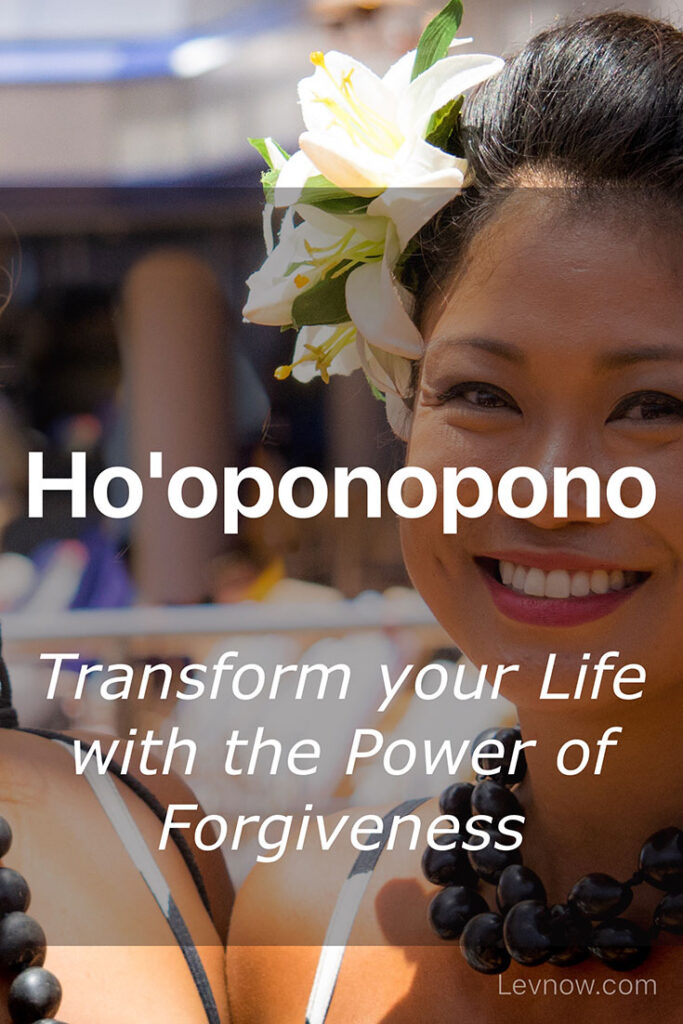If you’ve ever found yourself yearning for a deeper sense of fulfillment and purpose in life, the ancient Hawaiian practice of Ho’oponopono might just hold the key. Derived from the words ho’o (to create) and pono (rightness), this powerful technique promotes healing and reconciliation by focusing on taking full responsibility for oneself and clearing internal blocks. In this article, we explore whether or not Ho’oponopono has the potential to be a transformative tool in bringing us closer to achieving our life goals.
What is Ho’oponopono?
Definition of Ho’oponopono
Ho’oponopono is a traditional Hawaiian practice of reconciliation and forgiveness. The word “Ho’oponopono” can be translated to mean “to make things right” or “to rectify an error.” It is a spiritual process that involves taking responsibility for our own actions, thoughts, and beliefs, in order to heal and restore harmony in our lives and relationships.
Origins of Ho’oponopono
Ho’oponopono has its roots in ancient Hawaiian culture and its philosophy of interconnectedness. It was traditionally practiced by native Hawaiians as a way to resolve conflicts within families or communities. The practice was facilitated by a respected elder or spiritual leader, who guided the process of forgiveness, reconciliation, and healing.
Principles of Ho’oponopono
Ho’oponopono is based on several key principles:
-
Self-Responsibility: Ho’oponopono emphasizes taking full responsibility for our own experiences and the impact we have on others. It recognizes that we are co-creators of our reality and that healing begins with acknowledging our own role in any situation.
-
Forgiveness: Forgiveness is at the core of Ho’oponopono. It involves releasing resentment, anger, and blame towards ourselves and others. By forgiving, we free ourselves from the emotional baggage that prevents us from experiencing inner peace and achieving our life goals.
-
Reconciliation: Ho’oponopono aims to restore harmony and balance in relationships. It encourages open communication, apology, and forgiveness between individuals involved in conflicts or misunderstandings. It recognizes the importance of resolving conflicts and healing relationships for personal growth and collective well-being.
-
Divine Connection: Ho’oponopono acknowledges the presence of a higher power, often referred to as the Divine or the Universe. It recognizes that we are part of something greater and that seeking guidance and support from the Divine is essential for healing and transformation.
Understanding Life Goals
Definition of Life Goals
Life goals refer to the desired achievements, experiences, or milestones that individuals strive for in their personal and professional lives. These goals give purpose and direction to our actions, guiding us towards fulfilling and meaningful lives. Life goals can encompass various areas, such as career, relationships, health, personal development, and spirituality.
Importance of Setting Life Goals
Setting life goals provides clarity and focus to our efforts. It helps us identify what truly matters to us, and allows us to prioritize our time, energy, and resources accordingly. Without clear goals, we may feel lost or stagnant, lacking motivation and direction. Setting life goals not only gives us a sense of purpose but also helps us measure progress and celebrate achievements along the way.
Types of Life Goals
Life goals can be categorized into different areas of life:
-
Career Goals: These goals focus on professional development, such as achieving a certain position, starting a business, or acquiring new skills and knowledge.
-
Relationship Goals: Relationship goals involve cultivating healthy and fulfilling connections with family, friends, romantic partners, or colleagues. They may include improving communication, deepening intimacy, or resolving conflicts.
-
Health and Wellness Goals: These goals pertain to physical, mental, and emotional well-being. Examples include maintaining a balanced diet, exercising regularly, practicing self-care, or managing stress effectively.
-
Personal Development Goals: Personal development goals involve continuous learning, self-improvement, and growth. They may include developing new hobbies, learning a new language, cultivating resilience, or enhancing emotional intelligence.
-
Spiritual Goals: Spiritual goals focus on nurturing a sense of purpose and connection to something greater than oneself. They may involve seeking inner peace, practicing mindfulness, exploring one’s beliefs, or engaging in acts of service.

The Connection between Ho’oponopono and Life Goals
Ho’oponopono as a Tool for Self-Improvement
Ho’oponopono can be a powerful tool for self-improvement and personal growth. By taking responsibility for our actions, thoughts, and beliefs, we can identify and address any self-limiting or negative patterns that may hinder our progress towards life goals. The practice of Ho’oponopono encourages self-reflection and self-awareness, enabling us to make conscious choices aligned with our true desires.
Clearing Limiting Beliefs and Blocks with Ho’oponopono
Ho’oponopono offers a way to release and heal limiting beliefs, past traumas, and emotional blocks that may be preventing us from achieving our life goals. Through forgiveness and reconciliation, we can let go of resentment, fear, and self-sabotaging patterns. By clearing these obstacles, we create space for new possibilities and positive experiences to manifest in our lives.
Aligning with Your True Self through Ho’oponopono
Ho’oponopono invites us to connect with our true selves, our authentic desires, and our higher purpose. By aligning with our true selves, we can make conscious choices that are in line with our values and aspirations. This alignment empowers us to pursue life goals that are truly meaningful and fulfilling, leading to a greater sense of purpose and satisfaction.
The Practice of Ho’oponopono for Achieving Life Goals
Step 1: Taking Responsibility
The first step in practicing Ho’oponopono for achieving life goals is to take full responsibility for your experiences and actions. Acknowledge that you are the creator of your reality and that you have the power to shape your life. By taking responsibility, you reclaim your personal power and become an active participant in your own transformation.
Step 2: Acknowledging and Repenting for Mistakes
Acknowledge any mistakes or wrongdoings you may have made in the past that have impacted your life or hindered your progress towards your life goals. Admitting these mistakes is a crucial part of the healing process. Repenting involves feeling genuine remorse and committing to making amends and improving yourself moving forward.
Step 3: Forgiving Yourself and Others
Forgiveness is a central aspect of Ho’oponopono. Forgive yourself for any past mistakes, shortcomings, or perceived failures, recognizing that you are a work in progress. Extend forgiveness to others who may have caused you pain or who you feel have hindered your progress. By forgiving, you release emotional baggage and allow healing and growth to take place.
Step 4: Letting Go and Releasing
Letting go is essential for achieving life goals. Release any attachment to outcomes, expectations, or past hurts. Practice surrendering and trusting in the process of life. Letting go allows space for new opportunities and experiences to flow into your life. Trust that the universe has your best interests at heart and that everything unfolds as it should.
Step 5: Engaging in Self-Reflection and Gratitude
Engage in regular self-reflection to gain insight into your desires, values, and progress towards your life goals. Practice gratitude for the lessons, opportunities, and blessings that come your way. Cultivate an attitude of appreciation and abundance, which will attract more positive experiences into your life.

Benefits of Using Ho’oponopono for Life Goals
Inner Peace and Emotional Healing
By practicing Ho’oponopono, you can experience inner peace and emotional healing. The forgiveness and reconciliation process helps release negative emotions, such as anger, resentment, or guilt. This emotional healing allows you to cultivate a state of inner calm and harmony, which positively influences your ability to pursue and achieve your life goals.
Clarity and Focus
Ho’oponopono brings clarity and focus to your life goals. Through self-reflection and alignment with your true self, you gain greater clarity on what truly matters to you and the steps needed to achieve your goals. The practice helps you filter out distractions and make informed decisions that align with your values and aspirations.
Improved Relationships and Connections
Ho’oponopono fosters improved relationships and connections with others. By seeking forgiveness, offering forgiveness, and engaging in open communication, you can heal relationships that may have been strained or broken. Improved relationships create a supportive and harmonious environment, which can enhance your ability to achieve your life goals.
Increased Self-Confidence and Motivation
Through the practice of Ho’oponopono, you gain a deeper sense of self-confidence and self-worth. By taking responsibility for your experiences and releasing self-sabotaging beliefs, you empower yourself to take bold actions towards your life goals. This increased self-confidence fuels motivation, persistence, and resilience in the face of challenges.
Manifestation and Attracting Opportunities
Ho’oponopono can act as a catalyst for manifestation and attracting opportunities. By clearing limiting beliefs and releasing emotional blocks, you create space for positive experiences and opportunities to manifest in your life. As you align with your true desires and take inspired actions, you open yourself up to receive the abundance and opportunities that support your life goals.
Case Studies: Real-Life Examples of Ho’oponopono and Life Goals
Case Study 1: Overcoming Limiting Beliefs to Start a Successful Business
Alex had always dreamt of starting their own business but was held back by self-doubt and limiting beliefs. Through practicing Ho’oponopono, Alex identified and cleared deep-seated beliefs around worthiness and fear of failure. By taking responsibility for their own growth and forgiving themselves for past mistakes, Alex gained the confidence to launch their business. With unwavering focus and a positive mindset, Alex achieved their life goal of starting a successful business.
Case Study 2: Healing Past Trauma and Finding Love
Sarah had experienced past trauma that had left her with deep emotional wounds and a fear of intimacy. Through the practice of Ho’oponopono, Sarah embarked on a journey of self-healing and forgiveness. By forgiving herself for blaming herself for the trauma and forgiving those who had hurt her, Sarah was able to release the emotional blockages that were hindering her from finding love. As she embraced self-love and cleared negative beliefs about relationships, Sarah attracted a loving and healthy partnership into her life.
Case Study 3: Achieving Financial Abundance through Ho’oponopono
Adam struggled with financial abundance and felt stuck in a cycle of scarcity. Through the practice of Ho’oponopono, Adam identified and cleared deep-rooted beliefs around money and worthiness. By taking responsibility for his financial situation and forgiving himself for past financial mistakes, Adam transformed his mindset and relationship with money. With a newfound sense of abundance and gratitude, Adam attracted opportunities for financial growth and achieved his goal of financial abundance.
Case Study 4: Personal Growth and Career Advancement
Emily felt unfulfilled and stagnant in her career, lacking direction and purpose. Through Ho’oponopono, Emily realized that limiting beliefs and self-doubt were holding her back. By taking responsibility for her own growth and forgiving herself for not pursuing her passions sooner, Emily embarked on a journey of personal growth and career advancement. As she aligned with her true desires and took inspired actions, Emily found the courage to pursue her dream career and achieve personal success.

Tips for Incorporating Ho’oponopono into Your Life Goal Journey
Consistency and Commitment
Consistency and commitment are key when incorporating Ho’oponopono into your life goal journey. Make it a daily practice to engage in the forgiveness and reconciliation process. Set aside dedicated time and create a sacred space for reflection, prayer, and meditation. Consistency and commitment will deepen your connection with the practice and amplify its transformative effects.
Integrating Ho’oponopono into Daily Practice
Integrate Ho’oponopono into your daily life by incorporating simple rituals and affirmations. Practice gratitude regularly by acknowledging the blessings and lessons in your life. Repeat affirmations such as “I am open to forgiveness and healing,” “I release all limiting beliefs,” and “I am worthy of achieving my life goals.” These daily practices reinforce the principles of Ho’oponopono and help you stay aligned with your life goals.
Seeking Guidance from Ho’oponopono Practitioners
If you feel the need for further guidance and support, consider seeking the assistance of a Ho’oponopono practitioner or attending workshops and retreats focused on the practice. These experts can provide insight, personalized guidance, and tools to deepen your Ho’oponopono practice and achieve your life goals.
Combining Ho’oponopono with Other Goal-Setting Techniques
Ho’oponopono can be complemented by other goal-setting techniques and practices. Consider integrating visualization, journaling, or affirmations into your routine. Visualize your life goals as already achieved, write down action steps and milestones, and repeat affirmations that align with your desired outcomes. Combining Ho’oponopono with other techniques amplifies their effectiveness and supports your journey towards achieving your life goals.
Common Challenges and How to Overcome Them
Resistance to Self-Forgiveness
One common challenge in practicing Ho’oponopono is resistance to self-forgiveness. It can be difficult to let go of past mistakes or to believe that you deserve forgiveness. Overcome this challenge by embracing self-compassion and reminding yourself that everyone makes mistakes. Recognize that self-forgiveness is an essential part of the healing process and allows you to create a better future for yourself.
Dealing with Deep-Seated Issues
Addressing deep-seated issues and traumas can be challenging on your own. Consider seeking the assistance of a trained therapist or counselor who can provide professional support and guidance. They can help you navigate the healing process and provide tools and techniques that complement your Ho’oponopono practice.
Patience and Trust in the Process
Healing and achieving life goals take time and patience. Trust in the process of Ho’oponopono and acknowledge that progress may not always be linear. Embrace the journey as an opportunity for growth and learning. Have faith that, as you continue to practice Ho’oponopono and align with your true self, the universe will support you in achieving your life goals.

Conclusion
In conclusion, Ho’oponopono can be a transformative practice in achieving life goals. By embracing forgiveness, self-responsibility, and reconciliation, you create the space for healing, personal growth, and manifestation. Through the practice of Ho’oponopono, you can experience inner peace, clarity, improved relationships, and increased self-confidence, all of which support your journey towards achieving your life goals. Embrace Ho’oponopono as a powerful tool for self-improvement and transformation, and watch as it empowers you to live a fulfilling and purposeful life.
